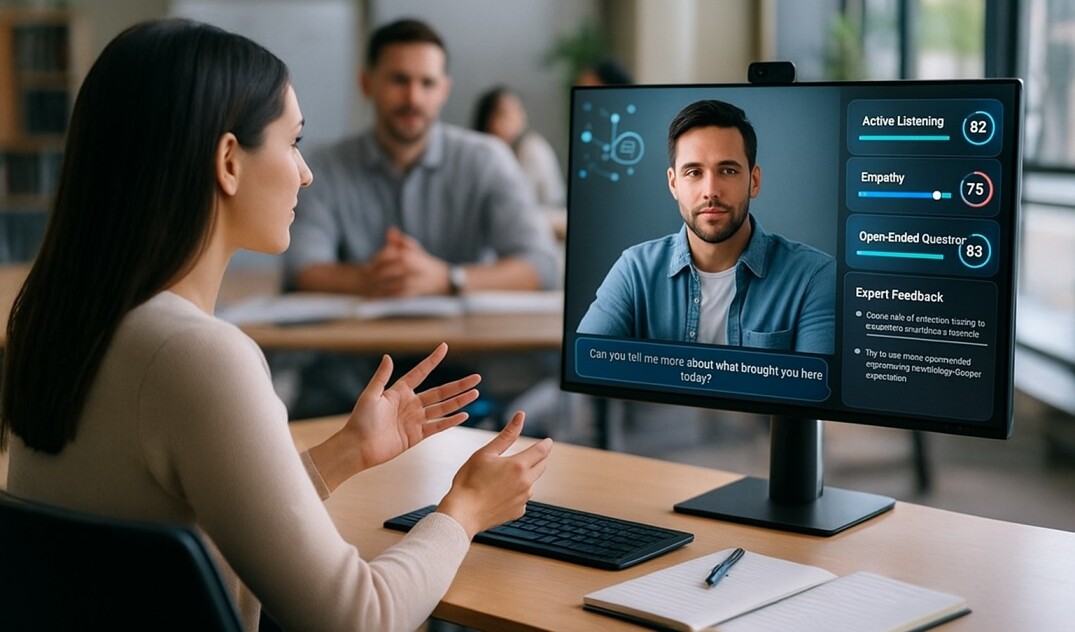In the field of behavioral health, the mastery of complex theoretical frameworks is essential. However, the true artistry of clinical practice lies in the effective application of foundational micro-skills. These seemingly simple behaviors—active listening, reflection of feeling, open-ended questioning, summarizing, and confrontation—are the building blocks of the therapeutic alliance and the primary vehicles for change. Research confirms that the therapeutic relationship is one of the most consistent predictors of positive client outcomes across different treatment modalities (Flückiger et al., 2018).
🧩 The Challenge of Teaching Micro-Skills
Despite their importance, teaching micro-skills effectively is challenging. Students often grasp the concepts intellectually but struggle to apply them. Early attempts to use these skills can feel mechanical, awkward, or inauthentic, hindering rapport development and increasing student anxiety. Traditional methods, such as reading textbooks or observing experienced clinicians, are necessary but insufficient for developing procedural knowledge—the ability to do rather than just know.
🎯 Deliberate Practice: The Path to Mastery
The concept of deliberate practice, popularized by psychologist K. Anders Ericsson, offers a framework for mastering complex skills. Deliberate practice involves breaking down performance into specific components, engaging in focused rehearsal, receiving immediate feedback, and refining performance accordingly (Ericsson & Pool, 2016). This iterative process moves skills from the cognitive domain (knowing what to do) to the autonomous domain (doing it intuitively).
In behavioral health, deliberate practice provides a structured approach to skill development that goes beyond the generalized experience gained through internships or role-plays. It focuses on refining specific techniques until they become second nature.
🤖 AI as a Tool for Deliberate Practice
Artificial Intelligence (AI) offers a powerful tool for implementing deliberate practice in micro-skills training. AI-powered simulations, such as THT’s specialized tool to Master Your Clinical Micro-Skills, can provide the essential components required for effective skill acquisition:
- 🔁 Repeated Rehearsal: AI allows students to practice the same skill repeatedly in varied contexts.
- ⚡ Immediate and Specific Feedback: This is where AI excels. Instead of waiting for a supervisor or peer, AI tools can offer immediate analysis of a student's response. This real-time feedback accelerates the learning curve.
- 📈 Graduated Difficulty: AI activities can be calibrated to match the student's developmental level, starting with simple scenarios and gradually increasing the complexity.
- 🛡️ A Safe and Consistent Environment: AI provides a consistent training environment where students can focus on their performance without the pressure of being evaluated by a human or the fear of harming a client.
✅ Conclusion
Mastering clinical micro-skills is essential for effective behavioral health practice. By integrating the principles of deliberate practice with the capabilities of AI, universities can equip students with the tools they need to move from awkward application to intuitive mastery. This approach not only enhances clinical competence but also builds the confidence students need to navigate the complexities of the therapeutic relationship.
🚀 Ready to Bridge the Gap?
Learn how you can integrate targeted, AI-driven deliberate practice into your curriculum by exploring our AI solutions.
To see our Micro-Skills training tools in action, please contact me, Raymond Barrett, LMHC, Founder and CEO, for a demonstration.
📚 References
- Ericsson, A., & Pool, R. (2016). Peak: Secrets from the new science of expertise. Random House.
- Flückiger, C., Del Re, A. C., Wampold, B. E., & Horvath, A. O. (2018). The alliance in adult psychotherapy: A meta-analytic synthesis. Psychotherapy, 55(4), 317–340. https://doi.org/10.1037/pst0000172
